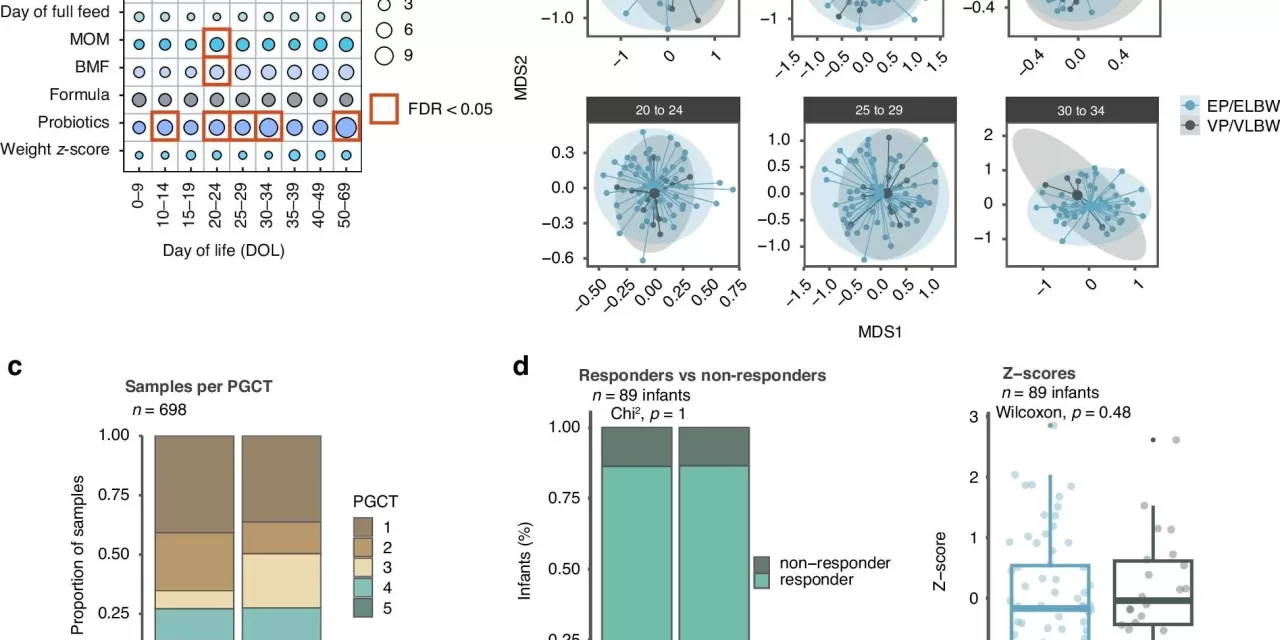In a groundbreaking study recently published in Pediatric Research, researchers from the United Kingdom have explored the impact of probiotic administration on the gut microbiome of extremely preterm (EP) and extremely low birth weight (ELBW) infants. The study aimed to determine whether probiotics, commonly used to reduce the risk of necrotizing enterocolitis (NEC) in preterm infants, affect these highly vulnerable groups differently based on their birth weight or gestational age.
Background and Controversies
Probiotics have been widely studied in preterm infants, showing potential benefits such as up to a 50% reduction in NEC in numerous randomized controlled trials (RCTs) and non-randomized studies. However, the variation in clinical outcomes due to differences in study methodologies, feeding regimes, and practical concerns regarding production and use has led to diverse guidelines from leading health organizations, including the World Health Organization (WHO) and the American Academy of Pediatrics.
This controversy has been further fueled by recent concerns, such as a case highlighted by the U.S. Food and Drug Administration (FDA), where probiotic-related sepsis was reported in a preterm infant. While meta-analyses suggest that probiotics can reduce the risk of NEC in infants under 32 weeks of gestation or weighing less than 1500 grams, their effectiveness in EP/ELBW infants remains uncertain. A recent Cochrane review even suggested that probiotics may have little or no impact on NEC risk in these particular infants.
Study Overview
The study involved 123 preterm infants, all born at less than 32 weeks of gestation or weighing under 1500 grams. Among them, 91 infants were classified as EP/ELBW (gestational age <28 weeks and/or birth weight <1000 grams), and 32 as very preterm (VP) or very low birth weight (VLBW) (gestational age 29–31 weeks and birth weight ≥1000 grams).
Samples were collected from infants at the Royal Victoria Infirmary in Newcastle between 2013 and 2016, during which time they were administered one of two different probiotics. These probiotics contained various strains of beneficial bacteria, including Bifidobacterium bifidum, Lactobacillus acidophilus, and Bifidobacterium longum subsp. infantis. The researchers analyzed 1431 stool samples from the infants over nine time points, using advanced DNA sequencing techniques to assess the microbial composition.
Key Findings
The study revealed that the gut microbiome of EP/ELBW infants is similarly impacted by probiotic administration as in VP/VLBW infants. Notably, about 86% of EP/ELBW infants and 87% of VP/VLBW infants were classified as “probiotic responders,” indicating that probiotics were effective in colonizing the gut with beneficial bacteria in both groups.
Despite the similar microbial effects, the study emphasized that this does not necessarily mean a direct reduction in NEC risk for EP/ELBW infants. The research highlighted that while probiotics were the most significant factor influencing the gut microbiome, further investigation is needed to determine whether these microbiome changes translate into improved clinical outcomes, such as reduced NEC incidence, in the most vulnerable infants.
Implications and Future Directions
This study represents an important step forward in understanding the potential benefits and limitations of probiotics for extremely preterm infants. Given the heightened risk of NEC in EP/ELBW infants, these findings could influence clinical decisions regarding the use of probiotics in this group. However, as the study authors note, additional research is needed to confirm whether the observed microbial changes lead to similar health benefits as seen in less vulnerable preterm infants.
As multi-omic research progresses, identifying biological markers of probiotic efficacy could become a crucial tool in personalizing treatment for preterm infants, ensuring that the most vulnerable patients receive the most appropriate care.
Conclusion
While this study sheds light on the effects of probiotics on the gut microbiome of EP/ELBW infants, the question of whether probiotics should be routinely given to these infants remains open. Clinicians must weigh the potential benefits against the risks, particularly in light of recent concerns about probiotic safety. Continued research in this area is essential to provide clearer guidance and improve outcomes for these at-risk infants.
Journal reference: Beck, L.C., Berrington, J.E. & Stewart, C.J. (2024). Impact of probiotics on gut microbiome of extremely preterm or extremely low birthweight infants. Pediatric Research.











